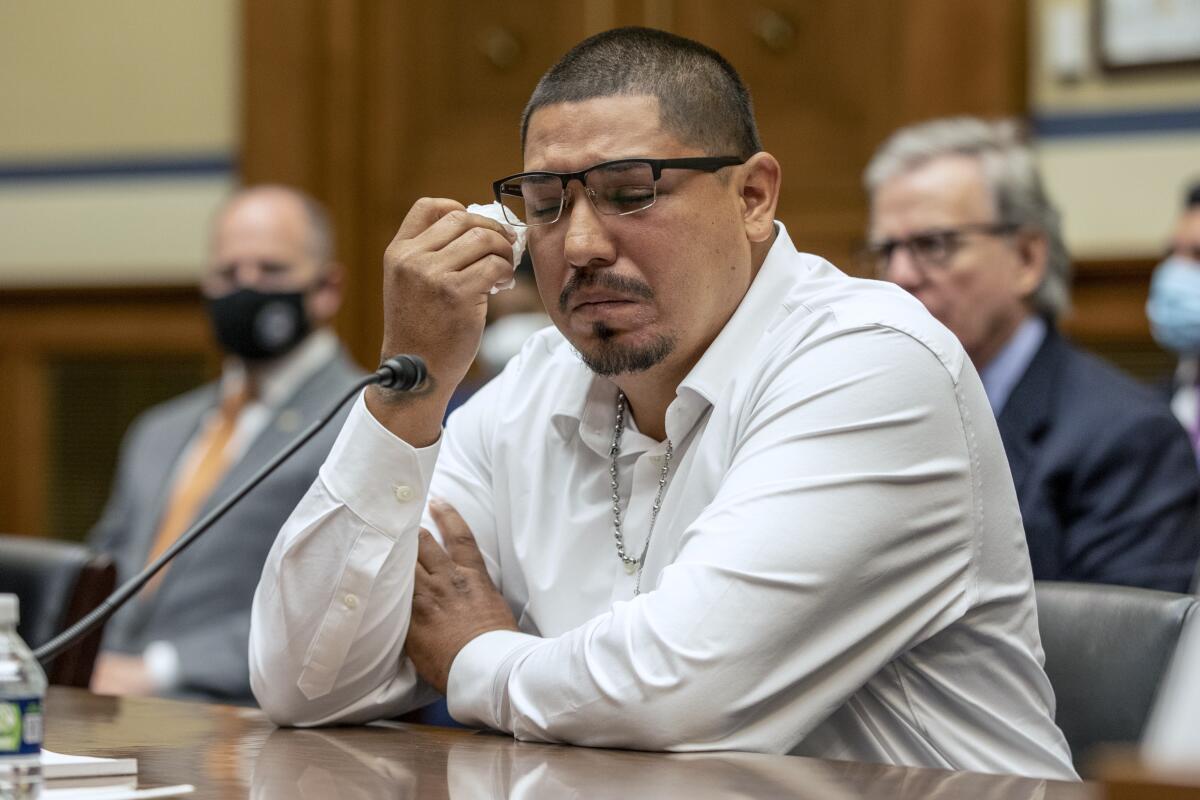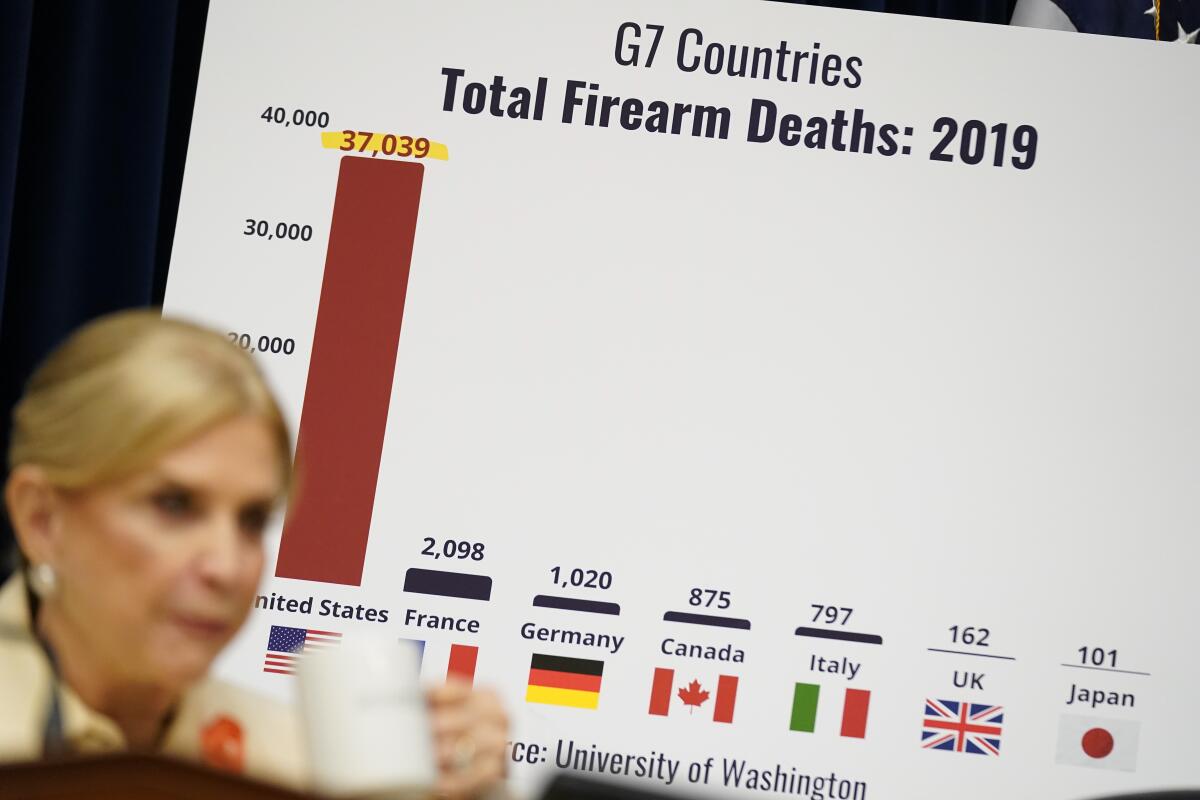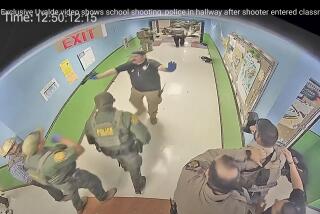Gun violence hearing: Chilling moments of testimony about mass shootings

WASHINGTON — Lawmakers on Wednesday heard heart-wrenching and gripping testimony from parents, a child and a pediatrician who were all personally touched by recent mass shootings — an effort by Democrats to highlight in dramatic terms the physical and emotional toll of gun violence.
The testimony before the House Oversight Committee came two weeks after 19 children and two teachers were shot and killed in a classroom in Uvalde, Texas. That massacre followed several other shootings, including one on May 14 in Buffalo, N.Y., that left 10 Black grocery shoppers dead and one at a Laguna Woods church that resulted in one person being killed and five others wounded.
The massacres have put pressure on lawmakers to strike a bipartisan agreement on gun restrictions and related safety measures.
“I am asking every member of this committee to listen with an open heart to the brave witnesses who have come forward to tell their stories about how gun violence has impacted their lives,” Rep. Carolyn B. Maloney (D-N.Y.) said. “Our witnesses today have endured pain and loss. Yet they are displaying incredible courage by coming here to ask us to do our jobs.”
Here are four major moments from the hearing:

In a prerecorded video, Miah Cerrillo tells lawmakers how she survived the fatal school shooting that claimed the lives of nineteen children and two teachers.
1. An 11-year-old shooting survivor shares her story
Miah Cerrillo, a fourth-grader at Robb Elementary School in Uvalde who survived the massacre by smearing herself in a classmate’s blood and pretending to be dead, described the horror she faced when an 18-year-old gunman entered her classroom on May 24 and started shooting. The gunman was killed when police stormed the classroom.
The students were watching a movie until the gunman arrived, Miah said in a prerecorded statement. “We went to go hide behind my teacher’s desk,” she said. “He shot my teacher and told my teacher ‘goodnight’ and shot her in the head. And then he shot some of my classmates.
“He shot my friend that was next to me,” she said. “So I grabbed the blood and put it all over me.” She shrugged and trailed off. “I stayed quiet. And then I grabbed my teacher’s phone and called 911.”
The 11-year-old said she doesn’t feel safe at school and is concerned she could again be the victim of a mass shooting.
After Miah spoke, her father, Miguel, said she “is not the same little girl that I used to play with.”
“Schools are not safe anymore,” he said. “Something needs to really change.”
2. A mother talks about the loss of her daughter
Kimberly Rubio told lawmakers about the uncertainty and angst she felt as she awaited word of her daughter’s fate. She testified that after learning about the shooting she ran barefoot for a mile to the school in search of news about her daughter, Alexandria Rubio, known as “Lexi.”
She and her husband, Felix, waited outside the school before heading to the city’s civic center, where they learned Lexi had died.
Earlier that morning, the Rubios had attended an award ceremony at the school for their daughter. Lexi received a “good citizen” award and was recognized for having straight A’s. They had promised to treat her to ice cream as a reward.
“I left my daughter at that school, and that decision will haunt me for the rest of my life,” Kimberly said, sitting next to Felix as they testified via video.
“We don’t want you to think of Lexi as just a number. She was intelligent, compassionate and athletic,” Kimberly said through tears. “Today, we stand for Lexi, and as her voice, we demand action. We seek a ban on assault rifles and high-capacity magazines.”
“Somewhere out there, there is a mom listening to our testimony, thinking, ‘I can’t even imagine their pain,’ not knowing that our reality will someday be hers, unless we act now,” she said.

3. A pediatrician describes a gruesome scene
Dr. Roy Guerrero, a pediatrician and lifelong resident of Uvalde who helped treat the wounded, described the carnage he witnessed. “I raced to the hospital to find parents outside yelling children’s names in desperation and sobbing as they begged for any news related to their child,” he said. “Those mothers’ cries will never get out of my head.”
He first saw Miah. She was shaking, and “the white ‘Lilo & Stitch’ shirt she wore was covered in blood. Her shoulder was bleeding from the shrapnel injury,” he said.
The rest of the day was a nightmare, he said, “something no prayer will ever relieve. Two children whose bodies had been pulverized by bullets fired at them.... Their flesh had been ripped apart. The only clue of their identities was the blood-splattered cartoon clothes still clinging to them.”
He decried lawmakers for the lack of progress in enacting gun restrictions. “In this case, you are the doctors and our country is the patient. We are lying on the operating table, riddled with bullets like the children of Rob Elementary and so many other schools,” he said. “We are bleeding out and you are not there.”
4. Lawmakers remain in gridlock on solutions
Lawmakers erupted in arguments throughout the hearing, signaling the lack of consensus on how to move forward. Democrats called for universal background checks, red flag laws, increasing the legal age to buy rifles and a ban on assault-style weapons. Republicans said it would be more effective to boost school security and focus on improving mental health care.
The hearing came on the same day the House passed a gun control bill that would raise the age limit for purchasing a semiautomatic rifle and prohibit the sale of ammunition magazines with a capacity of more than 15 rounds. The bill is not likely to advance in the Senate. In that chamber, Democrats and Republicans are trying to reach a more limited bipartisan deal.
President Biden last week called on Congress to deliver “common sense” reforms. In a 17-minute speech, he demanded specific measures, including expanded background checks and red flag laws that would confiscate firearms from people deemed a danger to themselves or to others. He also called for a ban on assault-style weapons and high-capacity magazines.
More to Read
Get the L.A. Times Politics newsletter
Deeply reported insights into legislation, politics and policy from Sacramento, Washington and beyond. In your inbox three times per week.
You may occasionally receive promotional content from the Los Angeles Times.











